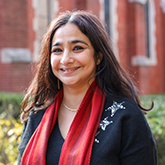
Professor Amrita Ibrahim has been an Engelhard Faculty Fellow for several consecutive semesters. One of the learning goals for her Intro to Cultural Anthropology course — the course that she most frequently teaches with an Engelhard component — is to develop first and second-year students’ understanding of themselves as gendered, sexual, and cultural beings. She expressed that during her first few semesters as an Engelhard faculty member, she struggled with getting students to have open dialogue about difficult topics. “Especially difficult was getting them to share intimate or vulnerable moments on topics that I had identified as worthy of discussion”, says Professor Ibrahim. “These included gender identity, race and discrimination, and mental health on campus.” She experienced all of these pedagogical struggles even before the pandemic, but it was her drive to improve learning outcomes, along with the forced transition to virtual learning that led her to develop creative ways to engage difficult topics. Gender identity in particular was a challenge, because while students recognize in the abstract that gender is an axis along which discrimination is experienced, they do not or will not identify it as operating as such in their own lives. For one of her class activities, she had students create an online collage that visualized how they express their gender, in which students were more participatory and reflexive than in her traditional in-person conversations. Another activity focused on food to make students realize that “just being American” is as much a cultural identity - complicated and contested - as any other. Engelhard was integral in providing the framing necessary to have these conversations about aspects of identity, and she’s made these more open-ended, creative engagements a part of her pedagogical philosophy.
“Every semester I am challenged to think about my syllabus in new ways, focusing on how and not only what students learn”, Professor Ibrahim continues. She cites this as her favorite part of being an Engelhard Faculty Fellow. Not only does she challenge students through creative pedagogy around anthropology, but she views Engelhard as a way to sharpen her course design skills to help students better understand these complexities.
“Every semester I am challenged [by Engelhard] to think about my syllabus in new ways, focusing on how and not only what students learn.”